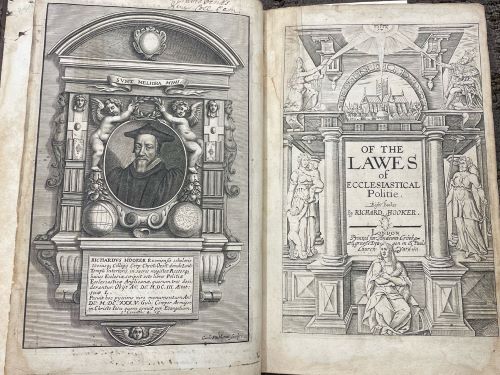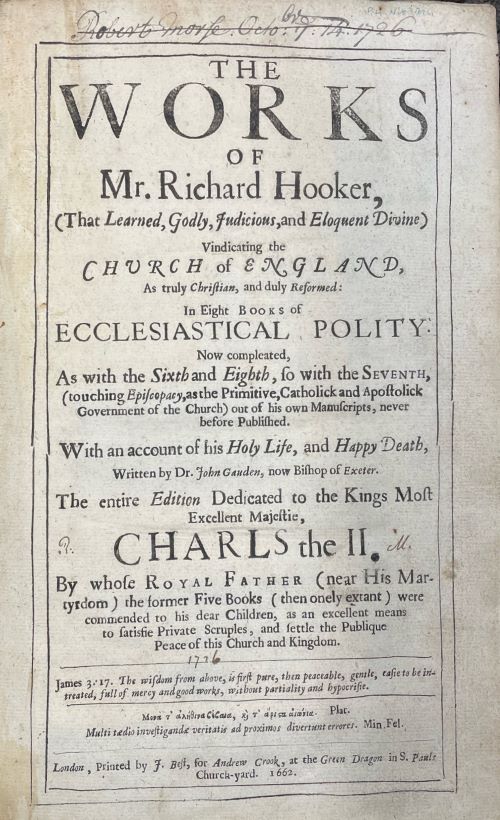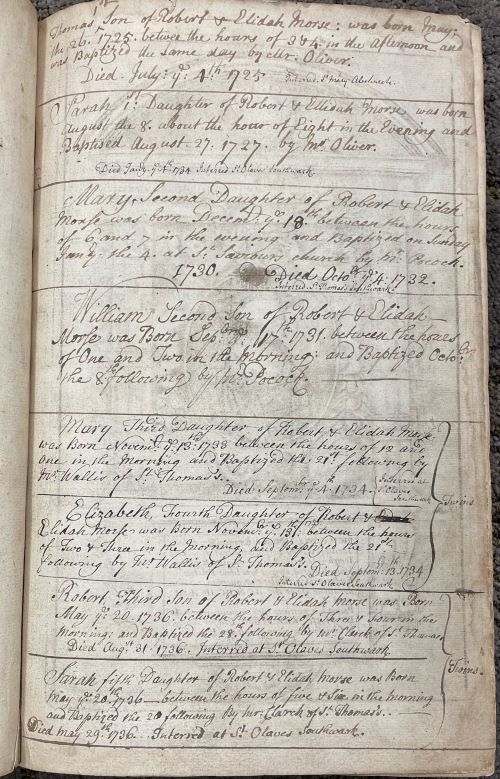It is hard to overstate the importance of Richard Hooker's Lawes of Ecclesiastical Polity. The book set out to describe the ways in which the Church of England was distinctive--neither Catholic nor Calvinist--and wound up all but creating the Anglican church by means of that description. The "judicious Hooker" argued that the Church of England possessed its own unique doctrines, and resisted attempts to define the Church as a reaction against Catholicism or a less radical Calvinism. So, the modest cover of the 1662 edition of Hooker's Lawes in the Hamburger collection at Liberty Fund belies the books extraordinary influence.
The Reading Room
Hooker’s Lawes of Ecclesiastical Polity: From the Liberty Fund Rare Book Room
The interior of the book is quite another story. It makes Hooker's importance very clear. The stunning two page engraving that greets the reader sets the title of the work inside ornate depictions of historical and religious statues engraved by William Hole. The title page faces a similarly ornately surrounded portrait of Hooker.

A second title page follows, which carefully specifies Hooker as "That Learned, Godly, Judicious, and Eloquent Divine." It also delves a bit into the complicated publishing history of the Lawes. Though since the first edition, the Lawe's title page always claimed that the Lawes contained eight books, only five were ever published during Hooker's lifetime, and the first edition only contained four. Hence, this edition is careful to specify that it is "now compleated, as with the Sixth and Eighth, so with the Seventh....never before published."

Hooker's work is arguably the first work of theology, philosophy, and political theory to be written in English. It is hard to convey how vital its arguments were to the people who read them. Hooker was not just arguing arcane points of theology and church governance. He was speaking to English people about who could and should be responsible for the state of their immortal souls and about the future of their nation.
The old chestnut about Hooker is with The Lawes of Ecclesiastical Polity we find "the Church of England saved with a good prose style." Much of Hooker's ornate literary style does not translate well to modern tastes, but he rewards the careful and patient reader with sentences like "They saw that to live by one man's will became the cause of all men's misery." HIs Lawes are well worth exploring.
I had intended to finish this blog post here. But old books are full of surprises. Early modern families who possessed a Bible would frequently use the book's blank pages to record important family happenings--particularly births, deaths, and marriages. It was a way of preserving family history by recording it in a book that was considered important enough to be passed down through generations. The family who owned this copy of Hooker's Lawe's clearly considered it to be a book of that significance, because its flyleaf has been used to record the births and deaths of the children born to Robert and Elidah Morse. It makes grim reading, alas, as child after child dies well before the age of five.
 It's a grim record, and a reminder that theological queries about the state of one's soul--or of one's children's souls--were of more than theoretical importance to Hooker's readers.
It's a grim record, and a reminder that theological queries about the state of one's soul--or of one's children's souls--were of more than theoretical importance to Hooker's readers.

A second title page follows, which carefully specifies Hooker as "That Learned, Godly, Judicious, and Eloquent Divine." It also delves a bit into the complicated publishing history of the Lawes. Though since the first edition, the Lawe's title page always claimed that the Lawes contained eight books, only five were ever published during Hooker's lifetime, and the first edition only contained four. Hence, this edition is careful to specify that it is "now compleated, as with the Sixth and Eighth, so with the Seventh....never before published."

Hooker's work is arguably the first work of theology, philosophy, and political theory to be written in English. It is hard to convey how vital its arguments were to the people who read them. Hooker was not just arguing arcane points of theology and church governance. He was speaking to English people about who could and should be responsible for the state of their immortal souls and about the future of their nation.
The old chestnut about Hooker is with The Lawes of Ecclesiastical Polity we find "the Church of England saved with a good prose style." Much of Hooker's ornate literary style does not translate well to modern tastes, but he rewards the careful and patient reader with sentences like "They saw that to live by one man's will became the cause of all men's misery." HIs Lawes are well worth exploring.
I had intended to finish this blog post here. But old books are full of surprises. Early modern families who possessed a Bible would frequently use the book's blank pages to record important family happenings--particularly births, deaths, and marriages. It was a way of preserving family history by recording it in a book that was considered important enough to be passed down through generations. The family who owned this copy of Hooker's Lawe's clearly considered it to be a book of that significance, because its flyleaf has been used to record the births and deaths of the children born to Robert and Elidah Morse. It makes grim reading, alas, as child after child dies well before the age of five.
 It's a grim record, and a reminder that theological queries about the state of one's soul--or of one's children's souls--were of more than theoretical importance to Hooker's readers.
It's a grim record, and a reminder that theological queries about the state of one's soul--or of one's children's souls--were of more than theoretical importance to Hooker's readers.